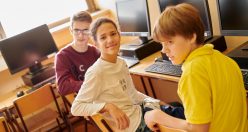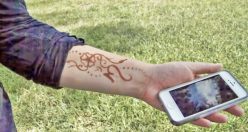This is a description of what you can expect to find within the Research updates section. This is a description of what you can expect to find within the Research updates section. This is a description of what you can expect to find within the Research updates section. This is a description of what you can expect to find within the Research updates section.
Search Global Kids Online
-

Brazil: mobile-only internet use grows
5th December 2019
The 7th edition of the ICT Kids Online Brazil survey was recently launched by the Regional Center for Studies on the Development of the Information Society (Cetic.br). Drawing on a nationally representative survey with 2,964 internet-using children aged 9 to 17 and one of their parents, the Brazilian study is the longest-running in the Global Kids Online network with annual waves since 2012.
-

Should we include more digital technologies in teaching?
7th November 2019
Montenegro is the first Global Kids Online country to produce comparable data on digital skills including children, parents and teachers. A national survey conducted by Ipsos, supported by UNICEF and Telenor, found that almost all teachers (94%) in Montenegrin primary and secondary schools use the internet on a daily basis. Educators tend to have better digital skills than children and parents. While teachers agree that the use of technologies improves the quality of education, many struggle to integrate diverse ways of using digital media in the learning process.
-

The online lives of New Zealand kids
30th September 2019
Netsafe’s latest research uncovers important insights about New Zealand children’s experiences online and their skills in navigating these online experiences. The report, the first to study online experiences of nine to 17 year old New Zealand children, found Kiwi kids are making the most of online opportunities for entertainment, learning and socialising.
-

Children’s rights and resilience in the digital world
24th September 2019
The Sydney eSafety 2019 conference saw policy makers, researchers and practitioners from different fields and countries come together to discuss how to improve children’s digital lives. Our presentation on Global Kids Online (GKO) provided a foretaste of our 11 country comparative findings report, and the insights gleaned from an independent evaluation report of GKO impact in our partner countries. Both reports will be published in the coming few months – watch this space.
-

Online on the phone: Czech children’s internet use
5th August 2019
A survey of 2,825 Czech children showed that 84% access the internet daily using their mobile phones and only 45% use a computer. Even the youngest children aged 9 to 10 years use predominantly their phones to go online (64% use it daily), while 29% of all children say that they are online on their mobile ‘almost all the time’. How does this affect their experiences and exposure to risk?
-

Costa Rica: highlights from the new research
15th July 2019
A new study on children’s internet use in Costa Rica was conducted by the University of Costa Rica and the Paniamor Foundation. The nationally representative survey with 1,008 children and their parents found important digital divides related to access, opportunities and skills. Using mobile phones for learning at school and receiving enabling mediation from parents can improve children’s digital skills and access to online opportunities.
Popular tags








